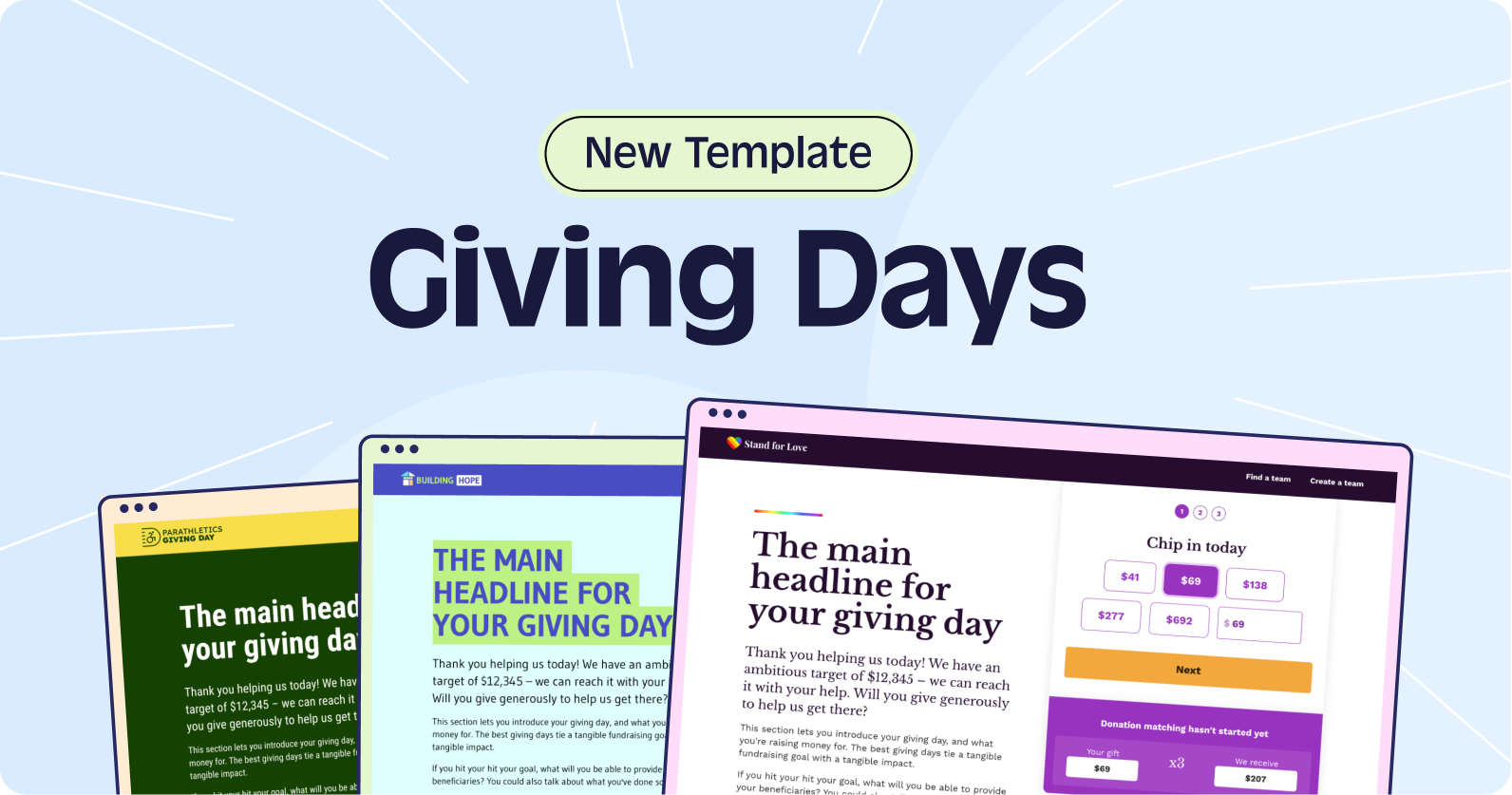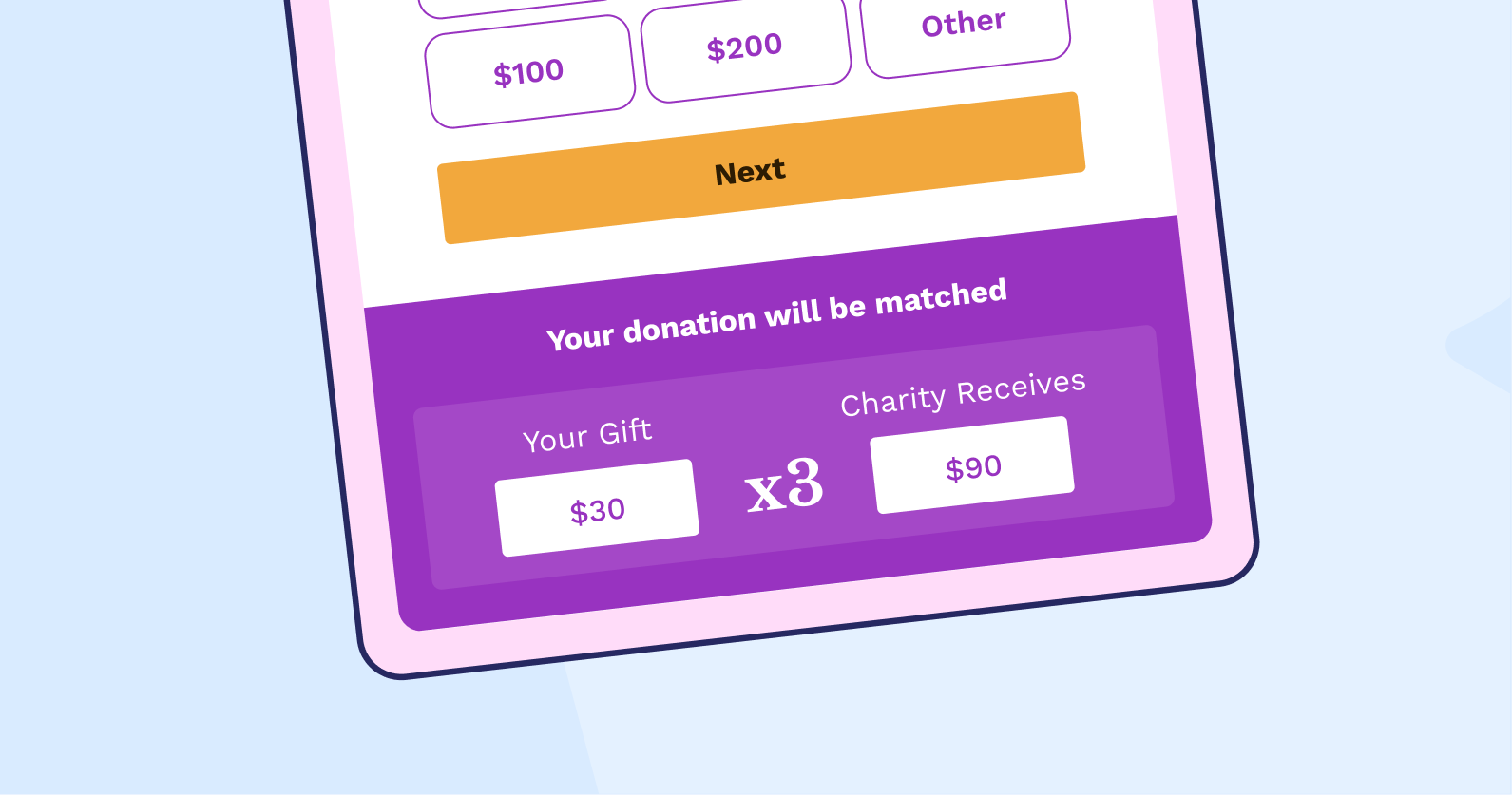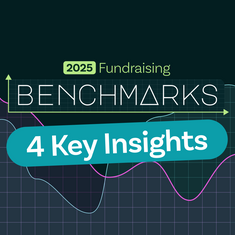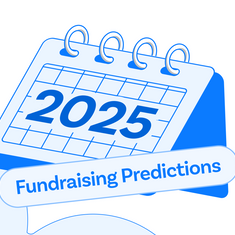
Online fundraising is critically important, but there’s more to it than you might think. Read our guide to ensure you’re maximising your strategy.
As more and more of our communication, media, shopping, and other day-to-day activities have moved to online platforms, charitable giving has followed the same trend. (What’s next, printing food and taking virtual showers?) To thrive in 2023, nonprofits need to not only connect with supporters in their favourite virtual spaces, but create online fundraising strategies to follow through and collect donations.
Every nonprofit organisation has a unique community of fans and supporters. To create an effective online fundraising plan for your organisation, you’ll need to find out where your supporters hang out, understand their preferences, and build an experience tailored to their preferences.
In this article, we’ll give you an overview of the most effective online fundraising strategies, explore some best practices for maximising online gifts, and look at the tools you’ll need to pull it all together.
Create a Diversified Online Fundraising Strategy
We all have our own preferences when it comes to the ways we interact with the world. Your community will engage more if you align your strategy with things like their favourite social media platforms, the number of emails they like to receive, and the payment options in their digital wallets.
Luckily, most nonprofits find that their supporter communities have a lot in common. An effective online fundraising strategy offers your supporters several giving options to choose from while creating urgency to act. Building your initial strategy is about understanding your supporters’ behaviour so you can map out your entire supporter journey.

Each of the gadgets in your online fundraising toolbox plays a unique role in meeting fundraising goals: email, SMS messaging, digital advertising, and social media. But you have to keep in mind that these things are always changing, which can be a challenge to keep up with.
2021 was the first year that more nonprofit website traffic came from users browsing on a mobile device than a desktop: 54%, to be exact. However, desktop users accounted for 65% of all donation transactions and 76% of all revenue. This neverending flux in donor behaviour is why it’s so important to constantly test what’s working and change up your online fundraising strategy as you go.
No matter how big your team or your marketing budget is, no organisation can be in all places at all times. But once you get up and running with online fundraising, cycles of donor acquisition, retention, and re-engagement should always be in progress.
Aim to raise the most money with the time and resources available by creating a diverse online fundraising strategy. This should include a few giving options and a number of different campaigns with different purposes throughout the year. Centre your annual fundraising strategy around the following objectives:
- Acquiring new donors
- Engaging with your community (turning existing donors into ambassadors)
- Raising more, both through campaigns and regular giving
Keep reading to learn about the different campaigns, digital marketing strategies, and online fundraising tools that’ll help you keep a flow of donations coming in every month.
Online Fundraising Campaigns
Your online fundraising strategy should include a few different ways to give, including frequent appeals for specific donation amounts, fundraising events, and peer-to-peer fundraising campaigns. Each of the campaign types described in this section has its unique benefits, so it’s wise to use a number of different strategies throughout the year.
You can reach different segments of your audience through targeted campaigns that mirror their values and preferences. Ask yourself: Where can your supporters go to make a donation at any time? What payment methods and donation amounts are the most popular? Where are your best opportunities for focused campaigns throughout the year?
Here are some of the best ways to ask for donations. Keep in mind that you’ll likely use a few of these strategies all the time and run more focused campaigns a few times a year:
Accept Online Donations
It should go without saying, but just in case, make sure there’s a donation form available on your website at all times! Make an emotional appeal to the reasons your community loves to give and list details about exactly how the funds will be used.
Spend time optimising your donation page and experiment with important pieces like header text, images, and calls to action to see what works best. Once your main fundraising page is live, you can combine it with other tools like email and social media to run basic campaigns.
Make Donation Appeals
For urgent needs and emergencies, you can send a detailed message requesting donations for a specific initiative. Email is a great way to get a lot of these messages out at a low cost, but direct mail shouldn’t be overlooked. It’s often more effective for securing larger gifts from older supporters.
The drawback with donation appeals is the more you ask, the less powerful those requests will be. Save direct asks for when you really need to use them!
Celebrate Giving Days
It seems like there’s a new oddball celebration every week. (Talk Like a Pirate Day, anyone?) But there are also key giving days that turn annual celebrations into great reasons to give. A giving day is a great way to increase awareness of your cause and your organisation while acquiring new donors. Pro tip: Activate your best peer-to-peer supporters to become your giving day ambassadors.
GivingTuesday is the most well-known example, but if you look, there may be other giving days that are relevant to your mission. Also consider creating an annual celebration to help your community raise awareness while attracting more donors.

Host Virtual Events
During the pandemic, we learned virtual fundraising events can be a very practical choice — and they’re not going away. There are several different ways you can use online events to create high-quality interactions with prospective supporters and new donors. Depending on your community’s interests, you may find that a webinar, live streaming entertainment, or a virtual walkathon is more appropriate.
We’ve added a couple of new functions on Raisely to make hosting online events easier than ever. Check out our new event ticketing feature with custom fields for things like T-shirt size or meal choice. Get all the information you need at event registration to create an awesome experience!
Pro tip: In-person or hybrid events are still a big part of your online fundraising strategy! Be sure to collect email addresses at sign-up or at the event, ask attendees to connect with you on social media, and use QR codes to create opportunities to give instantly.
Run a Peer-to-peer Campaign
A peer-to-peer fundraising campaign is when you empower your supporters to collect donations on your organisation’s behalf. It can be a bit complicated to set up individual fundraising pages and make sure the entire process is both intuitive and secure. However, after the initial setup peer-to-peer campaigns are a very low-maintenance part of your online fundraising strategy. Volunteer fundraisers do the heavy lifting, and as they share their personal ties to your organisation, their friends and family become dedicated supporters too.
The great thing about peer-to-peer fundraising campaigns is they engage both existing and new donors. They tend to raise more money than other campaign types and continue to pay off because of the expanding network effect.
Raisely is one of the best platforms for peer-to-peer fundraising because we’ve packaged everything you need into templates that you can quickly customise with your logo, fonts, and brand colours. We also make it easy for volunteer fundraisers to share their fundraising pages on social media with our new Facebook Fundraisers integration.
Activate Your Community
You don’t need to create a focused campaign to encourage your community to start their own crowdfunding campaigns. With Raisely, you can set up a community fundraising hub for DIY campaigns. Volunteers can choose from birthday fundraisers, memorials, fitness challenges, and more to fundraise around life’s most significant events. If your community loves to get creative, this is a great option for you!
Partner With Influencers
During a giving day or a big annual campaign, partnering with influencers like local celebrities can save you some work while helping you reach more people. Try arranging a social media takeover to get a little more attention when it really counts! High-profile personalities are often happy to partner on these opportunities because it gives them a great PR boost as well. Just be sure your guest makes a few announcements with plenty of time in advance and that they tag your social profiles correctly.
Make Online Gifts Go Further
It almost always costs more to acquire new supporters than it does to increase giving from your existing donor base. Again, you only have so much time and money to put into your online fundraising efforts! So once you have a plan in place to acquire new donors and make appeals for one-time donations, it makes sense to maximise the amount and frequency of individual gifts.
There are several tried-and-true tactics you can use to optimise for bigger, more frequent gifts. Make the most of your inbound traffic with these next-level strategies:
Recurring Gifts
Giving your supporters the option to set up automatic recurring donations makes it ridiculously easy for them to provide consistent support. A recurring giving program will ensure a predictable revenue stream, and giving days create great opportunities to reach out to new donors to try and encourage them to become regular givers. Not all online fundraising platforms have this functionality!
On Raisely, supporters can choose their giving frequency to make payments when it works best for them. Plan for donor retention by offering recurring donations, sending prompt thank-yous and follow-ups, asking them to subscribe to email and SMS services, and providing more opportunities to engage.
Matching Gifts
Just like your local influencers, large companies love to support nonprofits for a few different reasons, including the free publicity they receive. Give sponsors the opportunity to match or multiply individual donations during a specific campaign. This is another feature that some online fundraising platforms don’t support! Make sure your software can accept and accurately reflect matching gifts.
Raisely just launched a new Matched Giving Calculator that’s available on all campaigns. The block links up with the donation form and shows you the impact of your donation after matching. It’s a great add-on for anyone using matched giving, peer-to-peer campaigns, or appeals.

Measure What Works
Before you send anything out, determine how you’ll track key parts of your strategy and make sure you have the right analytics tools in place. One of the most important metrics to measure is conversions (number of donations made) for specific links, campaigns, or pieces of content. Read more about tracking conversions in our article on attribution. You can also analyse what donation amounts are the most common.
It’s helpful to look at benchmarks for similar organisations in your category, but when you’re just starting out, the most important number to beat is your own performance from the previous month or year. Raisely has a visual report builder, and you can schedule reports to run exactly when you need them. It also integrates with Google Analytics, Tag Manager, Search Console, and Facebook Pixel. Wherever your traffic is coming from, we’ve got you covered!
Create Your Online Fundraising Toolkit
Now that you have some ideas on what your online fundraising strategy needs to do, let’s talk about how to build it.
First, determine what kind of functionality you need from your fundraising tools, and then compare your options. There’s a lot of free software out there, and sometimes the low-cost, open-source option is the best choice. Creating a cost-effective strategy is about knowing where your dollars will make the biggest difference (often by saving you time) and where you should be a bit more frugal.
Use this list of the most common fundraising tech tools to start to envision what pieces you’ll need and how they fit together:
Online Fundraising Software
To create beautiful and functional donation pages that work with the rest of your online fundraising strategy, you’ll need fundraising software. There are many different platforms out there with different capabilities, and they range from free to a few hundred dollars a month. But be warned: There may be hidden fees for specific functionalities or usage. Raisely offers a ton of value — all with a forever-free account.
Payment Processing
Make sure you can accept whatever credit cards or virtual wallets your supporters like to use. Most of the time, the fundraising software you choose will limit your choices of payment processors. Raisely accepts all major credit cards, Stripe, PayPal, Apple Pay, Google Pay, and more.
Even if almost all of your fundraising is done online, it’s also important to consider supporters who prefer to give with cash and checks. Raisely allows you to manually enter offline donations too.

CRM
Customer relationship management (CRM) software can be pricey, so choosing fundraising software with donor management features like tagging, custom fields, and automated customer journeys is a smart move.
Some organisations will opt to use a separate fundraising platform and CRM. You’ll want to keep track of key details about your supporters like important dates, giving details, and contact information. Your CRM is a great source of insights when you’re planning online fundraising efforts. It’s also nice to be able to see their relationship with your organisation at a glance. Raisely has all of this and more!
Website
Your nonprofit’s website should be informative but interactive and focused on your supporters. It’s the main hub where people can learn about what you do and who you are, then decide to make a donation.
When creating your website, really tune into what your supporters care about and what’s important to them so you know how to build trust. A statement about what you do or the impact you make should be front and centre on your homepage, and it’s important to have a detailed about page that introduces your organisation’s leaders.
Did you know that you can build more than campaign pages with Raisely? We made custom domains available so you can design and host your entire website from our page builder for free. Advanced developers can use custom CSS, JavaScript, and more to create a site that’s fully customised to your branding and functions exactly the way you need it to.
Email Marketing Software
You’ll need to go above and beyond the basic free Gmail account to send mass emails and targeted automations to your community at key moments. When social media platforms and search engines change up their algorithms on you, email is the OG part of your strategy that will never let you down! You’re always one catchy subject line away from reaching your loyal subscribers.
All the transactional messages you need are included with the free Raisely plan, and with our messaging add-on, you have the ability to create custom automations. We also integrate with Zapier so you can set up automations with other email platforms if you like.
Social Media
You don’t have to be on every social media platform to stay connected with your community and be a part of their everyday life. You just have to be on the right ones! Building up your following is a long game, and it’s important to post consistently so your audience knows you’re really there. But once you’ve gotten into a rhythm, social media is a great tool to use on giving days and special occasions.
We recently announced our new Facebook Fundraising integration, which allows your community to collect donations without leaving Facebook. The data syncs between Facebook and Raisely in real time, so you manage the campaign without leaving your Raisely dashboard. Another useful social media feature on Raisely is your sharing settings: You’re in control of how your content shows up when people share it on different social media platforms.

Ads
While tools like email and social media are great for staying in touch with your existing audience, ads are one of the best ways to reach new people and grow your community. The most important thing to consider when creating ads is how to target specific profiles that resemble your existing audience. If you’re a locally focused organisation, geographic location will be extremely important for you. Be sure you read through all of your options before running an ad, and then check them again!
Analytics
Each of these different tools should have some internal analytics you can use to monitor performance. When your strategy spans several different platforms, this can get a little complicated! Finding fundraising software with a built-in CRM like Raisely will save you a lot of headaches, and integration with Google Analytics is important because it gives you an understanding of how supporters navigate between your website and campaign pages. The best news is, Raisely automatically integrates with Google Analytics and a suite of other tools!
Raisely Is Your Comprehensive Online Fundraising Platform
Meeting the major segments of your community wherever they like to spend their time online will clearly require a diverse and flexible approach. Central components of your strategy, like fundraising pages and your CRM, need the versatility to integrate with the platforms where your followers are and the other tools that keep the engagement and donations flowing.
Raisely is a mobile-first platform that works with all major payment processors and gives you the option to enable matched and recurring giving. Our built-in CRM, long list of integrations, and automation capabilities make Raisely a leading choice for ambitious, growing organisations.
Ten years ago, most small and medium nonprofits didn’t have the budget for the same tech solutions that businesses and larger organisations had access to. We created Raisely to bridge this gap, and we’ve been continuously improving since then to keep up with new innovations. We’ve built a library of free templates to make the creation process fast and simple, and our visual report builder helps you gather insights in a snap.
The best part? There are no fees to set up your free Raisely account and start raising money. Our platform is supported by an optional tip from donors. There are only a couple of add-ons you may choose to pay for on a monthly basis, like SMS messages, CRM records over the initial 2,000, and custom support.
Take the Leap into Online Fundraising Today
Whew! That was a lot of information. The world of online fundraising is vast and complex, but understanding these fundamentals will help you create a basic initial strategy. After that, it’s all about learning from experience!
We didn’t even scratch the surface of all the fun and creative ways you can inspire your online community to get involved and give. If you need a bit more inspiration to see the big picture for your nonprofit, check out more online fundraising ideas.
Ready to start building the heart of your online fundraising strategy? Sign up for your free Raisely account and start fundraising today.
Ready to create your
next campaign?

Kelsey Hoff is a content marketing specialist, freelance writer, blogger, and poet. She creates emotionally intelligent content that “listens first” for effective, ethical thought leadership.




